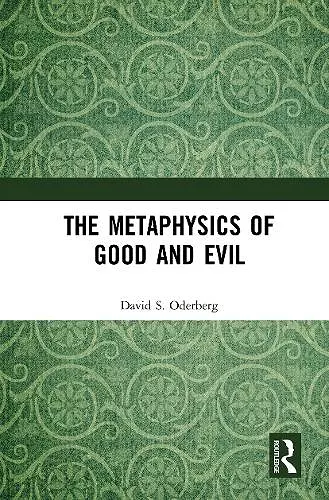The Metaphysics of Good and Evil
A Contemporary Defense of Scholastic Philosophy
Format:Paperback
Publisher:Taylor & Francis Ltd
Published:13th Dec '21
Currently unavailable, and unfortunately no date known when it will be back
This paperback is available in another edition too:
- Hardback£135.00(9780367408640)

This book offers a contemporary analysis of the Scholastic theory of good and evil, emphasizing its relevance and application in modern philosophy.
In The Metaphysics of Good and Evil, the author presents a comprehensive and contemporary defense of the Scholastic theory of good and evil through the lens of analytic philosophy. This theory, rooted in the works of influential thinkers like Aristotle, Augustine, and Aquinas, is examined in detail, focusing on the nature of goodness and evil. Goodness is understood as 'obedience to nature,' while evil is defined as the 'privation of goodness.' The text explores how these concepts manifest in both the non-living and living worlds, revealing unique characteristics of goodness in each context.
The book delves into various forms of goodness, aligning them with the Scholastic framework, and offers a robust defense of the privation theory of evil. This includes a contemporary examination of truthmakers for the truths of privation, as well as an analysis of causation in relation to privation. Ultimately, the author posits that all evil can be seen as 'deviance,' representing a departure from the inherent goodness dictated by a thing's essential nature.
Key features of The Metaphysics of Good and Evil include a thorough defense of a long-standing metaphysical theory using analytic philosophy, a revival of a neglected approach to understanding good and evil, and a demonstration of the ongoing relevance of Aristotelian-Thomistic thought in addressing fundamental philosophical issues. The work also offers a solid metaphysical foundation for exploring the origins of morality from a Scholastic perspective.
"Oderberg’s work provides theologians the clarity necessary to avoid spouting platitudes or nonsense when posed the question: if evil is, in itself, nothing but a lack of being, how can evil wreak so much damage? Oderberg’s response is that the theory on which evils are privations of being does not entail that evils are not real. Despite sin and evil remaining mysterious features of the world, then, the first half of the book and the concluding chapter on the reality of evil would be fruitful to anyone looking to understand or defend classical Christian reflection concerning the mysterium iniquitatis." - Fr. James Dominic Rooney, OP, Religious Studies Review
ISBN: 9781032239415
Dimensions: unknown
Weight: 453g
240 pages